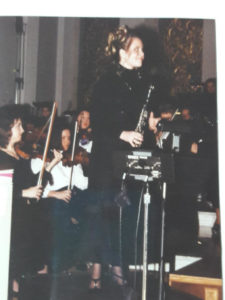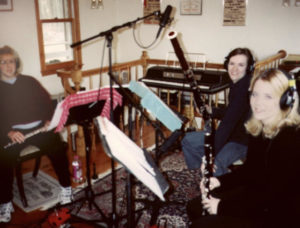Identifying Perfectionism
Many people in my current realm don’t know that for the better part of my life I was a classical musician. A clarinetist to be exact. I was the kid that practiced six hours a day after I got home from school. I won nearly every competition I ever entered, was accepted into eight of the top music colleges in the country with four full ride scholarships and four partial scholarships, graduated magna cum laude from music school, soloed with orchestras as a teenager and later went on to own my own entertainment agency where I booked myself and other musicians out for events, concerts and various other engagements. I’ve performed all over the US and Europe with some of the world’s greatest musicians and for famous personalities like Julia Child. Being a classical musician gave me the discipline to set myself up for success in life, but it also had a dark side. Reflectively I’ve been able to harness and use those lessons learned to create a life that’s richer and has a greater sense of fulfillment, purpose and peace.
The world of classical music is a haven for perfectionists. To some, it may seem dreamy to live your passion and display your talent for the world, but for me it actually created a life of viscous cycles of anxiety, adrenaline highs, followed by lows that conditioned me to constantly search for the next high……almost like a drug addiction but here the drug was adrenaline. On one hand it created the ability to be comfortable in uncomfortable situations but on the other it created an inability to ever feel fulfilled.
The Cycle: Musician prepares to audition for a gig. Musician experiences nerves (anxiety) leading up to the audition. Musician gets gig/wins audition. Musician experiences an ego based high after audition committee compliments them on their outstanding performance. Musician prepares days, weeks, months for actual performance in which they auditioned to perform. Musician experiences nerves (anxiety) leading up to the performance. Musician gives performance. It goes well. Everyone applauds, tells musician how wonderful they are, how talented they are and how they must have worked so hard to get to this point. Musician is on a high from the adrenaline of performing on stage and from the stroke to the ego from everyone telling them they are the greatest thing since Pavarotti. Musician wakes up next morning with a feeling of emptiness because “just like that” the high is now over. Suddenly the musician is searching for the next opportunity to give them that feeling that comes from a one-hour performance.
(Featured above) Solo performance with the Orlando Philarmonic Orchestra at 16 years old
Unlike some other types of music, in classical music, there is no room for mistakes. In an orchestral setting, a wrong note, out of tune passage, millisecond late solo entrance or a host of other seemingly minor mistakes is a good way to not get asked back to play another gig. With the pressure of perfectionism in just playing the notes on the pages correctly, you also have the pressure of measuring up to the conductor’s ideal of how you should interpret a particular passage of music as well as the pressure of your colleagues’ expectations, who also take themselves equally as serious. Because the overall production of the piece of music must be total perfection and there is a great deal of working together to achieve that perfection, it creates an environment where you are constantly being observed, assessed, judged and critiqued. Some people thrive in this environment. Over the course of my career, I became less and less comfortable with it, especially when I started to dig deep and fully understood my own addiction to the career.
(Featured above) Recording Session for Arf Arf Records
I have come to realize, perfectionism is the result of sophisticated trauma. Everyone experiences some level of trauma growing up and in their lives. No one has perfect parents and non one can escape every adversity. Some people grow up in homes where they are physically abused or a parent dies in a car accident or they have childhood cancer. Those are all types of obvious trauma. The pressure of expectations can also be viewed as a type of trauma and is where perfectionism is created. The feeling that you alone are not enough and that your accomplishments or abilities are what make you worthy can not only create some of the most prolific and talented people in our society but it can also manifest some of the most depressed, lost and unfulfilled.
After many years in the classical music world, I burned myself out. Notice I said “I” burned myself out as everyone in this field experiences it in a different way. I couldn’t live the cycle anymore and If I would have continued in it, I would be an angry, bitter person. In my late 20’s I decided to put it behind me. My 30’s were a time of trying to find what ignited me and at times I surely felt lost. Eventually I found my way to studying nutrition and a holistic lifestyle and ignited my passion again.
Interestingly, yoga ideology helped me to break my egotistical mindset and perfectionistic approach. I’m not saying that a little ego is a bad thing….in the words of John Mayer (LOL), it can be the booster to your rocket and what propels you forward at times. From an interpersonal standpoint I don’t think I came off as egotistical (at least I hope not), but when it came to achieving success, my ego was tied to my quest to be perfect and that success was tied to my desire to be accepted as a human being. In my own self discovery process and learning to harness that perfectionism, I realized that indeed happiness and fulfillment comes from:
- Helping others achieve their best self and making a difference in someone else’s life besides my own
- Self-improvement by measure of only improving where I was yesterday and not comparing myself or allowing anyone else to compare me to others
- Not creating an impossible to achieve ideal of who or what I should be
I now find my joy, passion and purpose in helping others be their healthiest self from both a mind and body standpoint and I harness my “desire to achieve” in individualized flow state sports. Flow state sports are those that require full mental immersion and don’t necessarily require competition, winning or that you be better than anyone but yourself. In the process your mind is strengthened and so is your body.
I tell this story about myself because perfectionism, many times, is what holds people back from achieving their goals, especially as they relate to health and weight loss.
Example: Perfectionist approach to losing 20 pounds: “For the next month I’m only going to eat 1000 calories per day with no carbs and I’m going to go to the gym every single day for two hours.”
What happens with this approach: Some initial success may be seen but in a weak moment, you eat a whole pizza and then the perfectionistic ego says, “I failed” so then you fall off the wagon and the yo-yo diet cycle continues.
Example: The mentally healthy way to approach losing 20 pounds: “Over the next year I’m going to look at changing my habits by adding in one new vegetable per week and weeding out one unhealthy food choice with an overall goal of losing one pound every 1-2 weeks. I’m also going to make an effort to move my body every day and increase my time in nature and my vitamin D exposure.”
What happens with this approach: Gradually you change your habits, accept you are not perfect and are able to regroup and get back on track after a less than ideal food choice. You end up losing the 20lbs in 8-12 months and it stays off forever.
If you’re ready to ditch perfectionism and improve your health and well-being, you know where to find me! www.hlyfemethod.com








